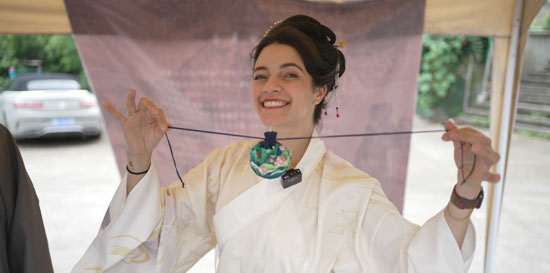
On June 21st, a garden party was held in Sanqishi Town, Yuyao, to celebrate the waxberry harvest and the Summer Solstice (the tenth of the traditional Twenty-Four Solar Terms). Marina Albernaz – marketing coordinator at Georgia School Ningbo (GSN) – was invited by Ningbo Evening News that day to take a cultural and culinary trip in Sanqishi Town. She tried Chinese traditional robes (hanfu), savored a special local summer treat (bean jelly with waxberries), learned to make Chinese traditional sachets, and played pitch-pot (a Chinese traditional game that had originated in the Warring States Period between 476-221 B.C.). Initiatives to boost rural tourism and make waxberry cultivation a local specialty were also presented as ways to promote common prosperity.
Since moving to China three and a half years ago, Marina has been fascinated by traditional Chinese culture. Culinary excursions to Chinese villages have allowed her to immerse herself in local cuisine, customs, history, and culture. The Summer Solstice – the firstly identified solar term – receives intense attention from Chinese people and it falls on June 21st this year. This was Marina’s first trip Sanqishi Town and the garden party. The town is known as “Home of Waxberry in China”, boasting a history of over two thousand years of waxberry cultivation. Local people are still improving their techniques to this day, and sideline products made from waxberries are in demand across the country. During the event, hanfu lovers wear ‘one-of-a-kind’ attire to celebrate the waxberry harvest and explore the poetry culture of the Song Dynasty (960-1279). Impressed by hanfu’s delicate embroidery, Marina also tried on this fabulous traditional garment with traditional Chinese makeup and hair buns.
Several booths were set up for the event, including the one selling the local summer treat, iced bean jelly with waxberries. Many ingredients were available for tourists to customize their bean jelly. Marina got a large bowl of iced bean jelly topped with a variety of fruits, including waxberry, lychee, yellow peach, and pitaya, as well as nuts. Its sweet-sour flavor and chewy texture make it a summertime favorite among locals. Marina’s curiosity was aroused after tasting the local sweets, which had a unique aroma that gave her a sense of calm and beat the summer heat. She approached a booth where several traditional scented sachets were displayed, as well as various glass bottles containing different Chinese herbs. Ancient Chinese people mixed Chinese herbs in sachets to repel mosquitoes and bugs in the summer, as introduced by the stand’s owner. It is still popular to this day, with people carrying scented sachets as perfume or hanging them indoors. Marina also got a chance to learn how to make a small sachet, in which she put cloves, sweet pine, peony bark, and borneol. Strolling down the booths, Marina noticed people were throwing arrows from a set distance into a canister at one stand. She walked over the stand and asked what they were doing. The owner explained it as a traditional Chinese game from the Warring States Period. If the arrows are thrown into the canister, the players score points. Marina tried several times and won bonus points for successfully throwing arrows into a smaller canister.
Having experienced the unique charm of traditional Chinese culture at the event, Marina’s final stop was the waxberry cultivation base, where she met Zhang Yun, Party chief of the Tanglizhang Village of Sanqishi Town. Mr. Zhang introduced the history of waxberry cultivation as well as the achievements and efforts locals have made to realize common prosperity. The town has a total area of 12,000 mu(800 hektares) under cultivation, with an annual output of 5,000 tons. A local waxberry grower and dealer also showed Marina how to select better waxberries by their colors and sizes.
Sanqishi Town, also known as Jinchuan in local records from the Qing Dynasty (1636–1912), is well-known for its amazing history and rich culture. The "shi" means fairs where people trade goods on certain days in ancient China. Yuyao is one of the most historically significant cities in China for its archaeological discoveries, such as Tianluo Mountain Site of China’s Neolithic age, an 8,000-year-old shell mound at the site of Jingtoushan ruins – which is also the earliest and most deeply buried shell mound site in coastal China – and prehistorical rice fields of Neolithic Hemudu Culture and Liangzhu Culture. Yuyao city is now striding toward common prosperity by developing rural tourism and waxberry cultivation. This trip was organized by Ningbo Evening News, offering expats in Ningbo a unique window into traditional Chinese culture and local history.
Reporter: Mei Jie
Proofreaders: Zhou Shiyi, Huang Dawang, Jason Mowbray


